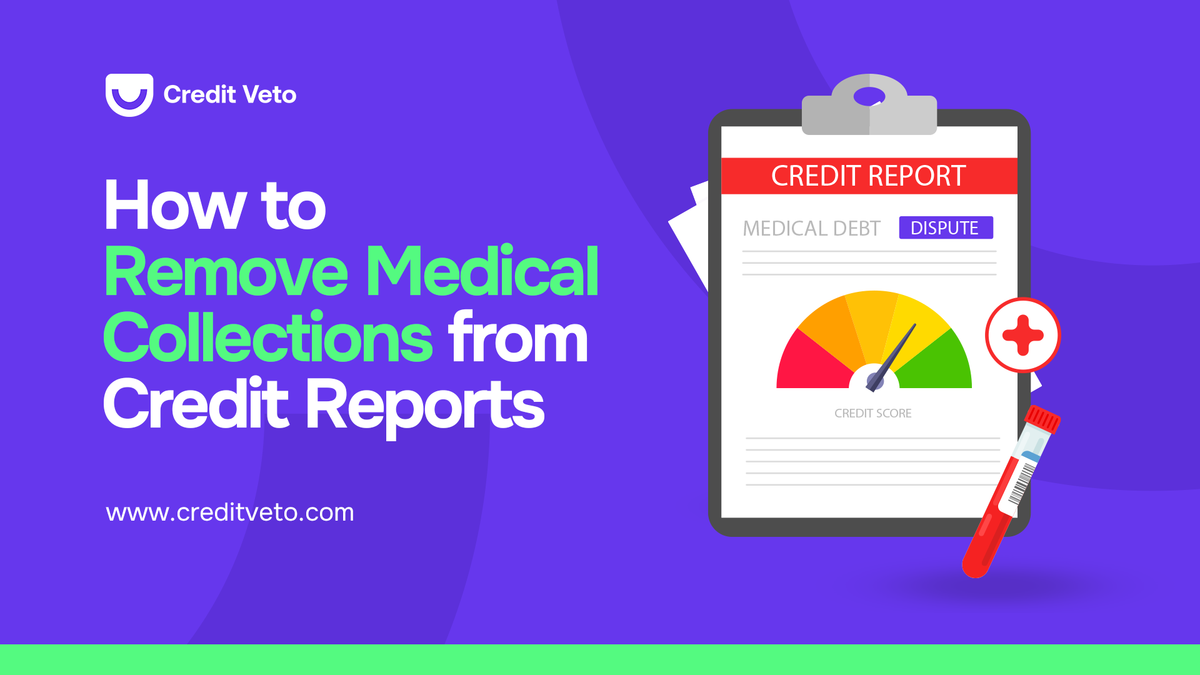How to Remove Medical Collections and Rebuild Credit
Here’s what you should know before paying another doctor bill. Medical collections can seriously damage your credit. Learn effective ways to remove medical bills from your credit report and protect your financial health.

You didn’t plan to get sick. You didn’t expect a surprise ambulance ride. And you definitely didn’t think one unpaid doctor bill could derail your credit score years later.
Yet here you are, getting denied for a credit card, mortgage, or car loan. Now it’s showing up where you least expected, on your credit report. Not because of bad spending habits, but because of medical debt you didn’t fully understand or didn’t even know existed.
If that sounds familiar, you’re not alone. Medical debt collections are one of the most common types of negative entries on credit reports, and they’re also among the most misunderstood. The good news? You can challenge it. And in many cases, you can remove it.
In this guide, you’ll learn how to remove medical collections from credit reports, understand your rights under HIPAA and federal law, and take the exact steps needed to protect your financial reputation.
Why Medical Bills End Up on Your Credit Report (Even If You Paid)
Medical debt doesn’t show up on your credit overnight. In most cases, it lands there after months of silence when a provider or hospital quietly hands your unpaid balance over to a third-party collection agency.
Once in collections, your medical debt can be reported to the credit bureaus as a derogatory account even if:
- The bill was never itemized properly
- Insurance was still processing the claim
- You were making minimum payments
- The collector has inaccurate or incomplete data
And yes, even a $900 ER copay or lingering Dr bills can appear on your report if left unresolved.
But there’s a silver lining.
As of 2023, new credit reporting guidelines require:
- A 1-year waiting period before unpaid medical debt can appear
- Removal of paid medical collections (regardless of amount)
- Elimination of under-$500 balances from credit reporting
Still, many debts before these changes remain on reports. And if yours is one of them, you’ll want to know how to remove medical debt from credit reports the right way. Thankfully, you're in the right place!
Read Also: How to Dispute Credit Report Errors and Win Every Time
How to Remove Medical Bills from Credit Reports (Legally)
Here’s a proven roadmap:
1. Get a Full Copy of Your Credit Reports
The first step in tackling medical collections on your credit report is to see exactly what is being reported. You can do this by visiting AnnualCreditReport.com, to request your credit reports from the three main credit bureaus: Equifax, Experian, and TransUnion.
It is important to check all three because medical collections may show up on one report but not on the others. Having a complete picture will help you understand the scope of your medical debts and where you need to focus your efforts. If you want to speed up the process and get your reports more efficiently, services like Credit Veto offer tools that can help you access your credit information quickly and easily.
2. Verify the Medical Collection Information
Once you have your credit reports in hand, the next step is to carefully examine the details related to any medical collections. You want to look for several key pieces of information, including the name of the collection agency that is reporting the debt, the original creditor, which is usually the hospital or clinic where the medical service was provided, the total balance owed on the account, and the date of the last activity or when the collection was reported.
Mistakes and inaccuracies are very common in credit reporting, especially with medical debts. If you notice anything that looks incorrect, such as a wrong creditor name, an amount you have already paid, or dates that do not match your records, these discrepancies give you valid reasons to file a dispute with the credit bureau to have the error investigated and potentially removed.
3. Request Debt Validation From the Collection Agency
You have important rights when dealing with collection agencies, one of which is the ability to request full validation of the debt they claim you owe. This right is protected under the Fair Debt Collection Practices Act, and it means you can ask the agency to prove that the debt is legitimate and that they have the authority to collect it. Think of it as asking them to show their work and confirm that everything is accurate.
To do this, send a clear, written request to the collection agency asking them to provide several key documents. These include proof of the original bill that led to the debt, a detailed breakdown of all charges included in the balance, and any paperwork that shows you are legally responsible for paying this debt.
Many collection agencies struggle to provide this information because records may be incomplete or they might not have the legal right to collect the debt in question. In some cases, they might simply stop contacting you once they realize you are serious about verifying the debt. This process alone can often lead to the removal of the medical collection from your credit report, giving you a strong advantage in protecting your credit health.
Use a Dispute Letter for HIPAA Violation of Medical Debt Collections
Now let’s talk about HIPAA (Health Insurance Portability and Accountability Act). It protects sensitive medical data, and debt collectors must comply.
Here’s where it gets powerful:
If a collection agency is reporting your medical debt without proper redaction (e.g., exposing procedures, diagnoses, or medical providers), it could be violating HIPAA.
You can write a dispute letter for HIPAA violation of medical debt collections to the credit bureau and the collection agency, citing improper disclosure.
In your letter:
- Request the deletion of the account due to a potential HIPAA breach
- Ask the agency to cease reporting the debt
- Attach a copy of your report with the specific entry circled
While not guaranteed, this has led to many deletions, especially when the agency lacks proper authorization or reporting practices.
See Also: 8 Quick Ways to Rebuild Your Credit After a Major Financial Setback
What If the Medical Debt Is Legit but You Still Want It Gone?
You owe the bill, but it’s hurting your score. Here’s what you can do:
Option 1: Pay and Request Deletion
If the bill is recent and over $500, you can offer to pay it but ask the collection agency for a “pay for delete” agreement in writing before you pay. Some agencies agree. Others won’t.
Important: Even if they decline, once you pay the debt, the new credit reporting rules now require it to be removed.
Option 2: File a Goodwill Request
Send a goodwill letter to the collection agency or original provider explaining your situation. Highlight how the debt was accidental (missed insurance coverage, emergency, etc.). Ask for removal out of fairness.
It doesn’t always work, but when it does, it works fast.
How Long Do Medical Bills Stay on Your Credit Report?
Under the Fair Credit Reporting Act (FCRA), unpaid medical debt can stay for up to 7 years from the date of first delinquency.
But here’s the breakdown:
If your report still shows paid medical collections, you can dispute them for immediate removal, especially if the account should’ve been deleted under current laws.
You Have More Power Than You Think
Medical collections are not a death sentence for your credit, but ignoring them often is. By understanding your rights under the FCRA, FDCPA, and HIPAA, you can dispute inaccurate records, negotiate removals, and take back control of your financial future.
Remember:
- Don’t pay a medical collection without a strategy
- Always validate debts before accepting them
- Use dispute letters carefully and with documentation
- Know what shouldn’t be on your report under the new rules
And if you’re wondering how long to keep medical bills for your records? Keep them for at least 7 years, especially if you’ve paid, disputed, or settled anything. Because when credit decisions are on the line, paper trails protect power.
Take Control of Your Medical Debt with Confidence
Removing medical collections from your credit report can feel overwhelming, but you don’t have to face it alone. With the right knowledge and tools, you can challenge inaccurate debts, protect your credit score, and move forward with greater financial freedom.
That’s where Credit Veto comes in. Our platform helps you monitor your credit in real time, guides you step-by-step through dispute processes like debt validation, and provides easy-to-use templates for sending effective dispute letters. Whether you’re just starting to clean up your credit or need help navigating complex medical collections, Credit Veto gives you the confidence and support you need.
Don’t let medical debt hold you back any longer. Sign up with Credit Veto today and take the first step toward reclaiming your credit health.
FAQs
Q: Can I remove medical collections myself, or do I need a company?
You absolutely can remove medical collections on your own by following the steps outlined above. However, if you feel overwhelmed or unsure about navigating the process, a trusted credit repair service like Credit Veto can provide expert guidance, automate much of the work, and help ensure nothing is missed.
Q: What if I don’t remember the medical bill at all?
If you don’t recall the bill, your best move is to request debt validation from the collection agency. They are legally required to prove the debt is yours and valid. If they cannot provide sufficient proof, the debt must be removed from your credit report.
Q: Can I dispute a medical bill that was already paid by insurance?
Yes. Sometimes insurance companies cover bills, but the debt still gets reported by mistake. In those cases, it’s crucial to dispute the item with the credit bureaus immediately and provide documentation showing the bill was paid by insurance.




Comments ()